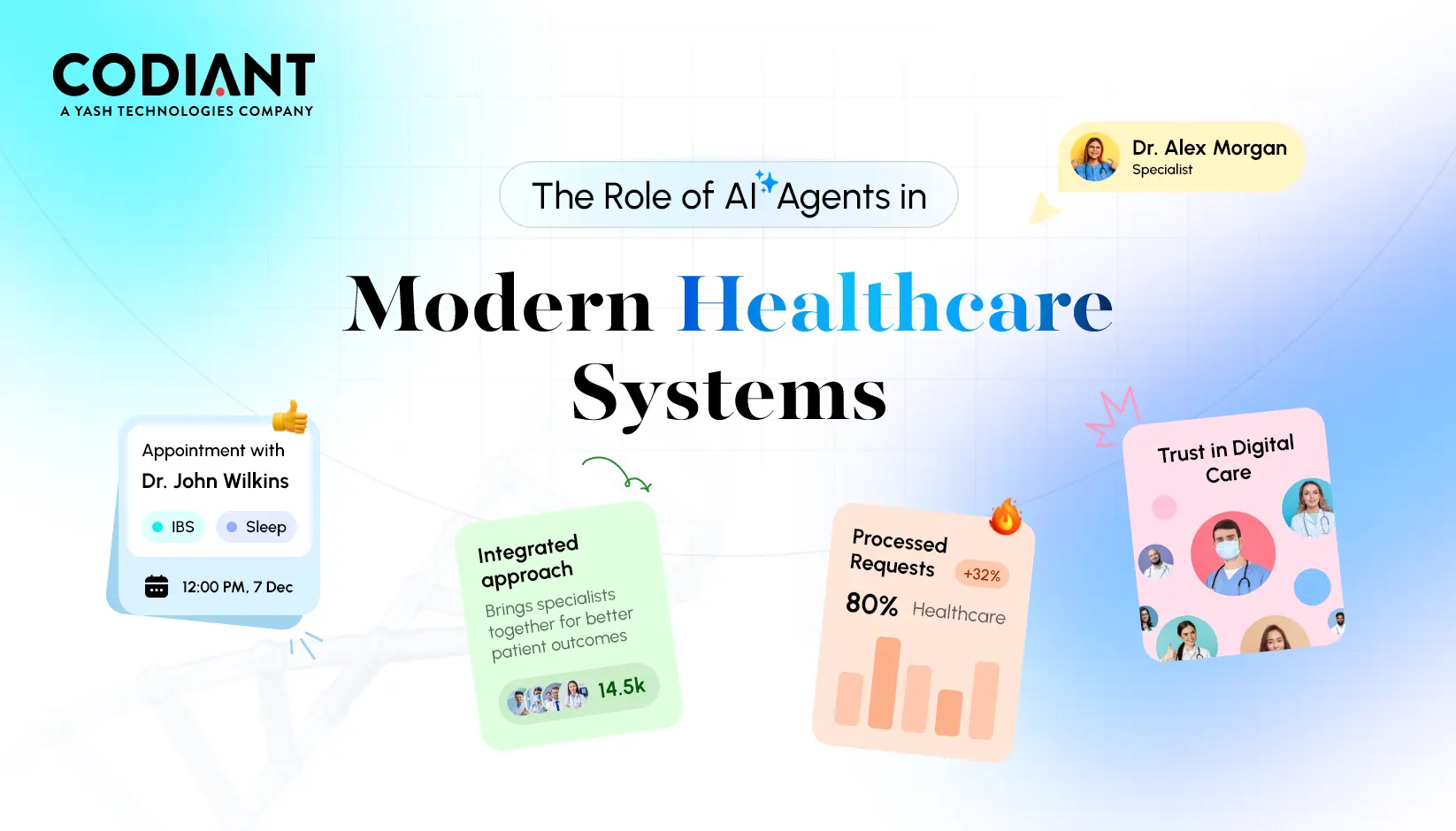Top Emerging Technologies for GCC Businesses In 2026
Table of Contents
Subscribe To Our Newsletter

The Gulf Cooperation Council (GCC) is quickly becoming a major center for technology, and it is attracting interest from investors and tech enthusiasts from all over the world. With huge investments from governments and businesses, this region is set to play a major role in the global technical ecosystem.
But what makes the GCC so attractive? There are a few key reasons:
- Strategic location: The GCC is perfectly located at the meeting point of Europe, Asia, and Africa, making it great for trade and investment.
- Supportive business environment: The GCC governments have created policies that make it easier for foreign investors and businesses to succeed.
- Young and tech-savvy population: The region has a large and growing number of young people who are very skilled with technology.
In this article, we’ll look at the top tech trends in the GCC for 2026 and how governments and businesses are pushing for more innovation.
AI and Machine Learning: The Game-Changers Redefining Innovation
Artificial Intelligence and Machine Learning are changing how businesses work in the GCC. AI helps with better decision-making, and Machine Learning finds useful patterns in data. Using these technologies can lead to big improvements and new chances for innovation.

Applications
AI and ML are transforming various industries:
Healthcare:
AI aids in diagnosing diseases, monitoring patients, and accelerating drug discovery. For instance, AI algorithms can analyse medical images to detect anomalies faster and more accurately than human doctors.
Finance:
AI is used for fraud detection, personalized banking, and real-time risk assessment. Machine learning models analyse transaction patterns to identify fraudulent activities and predict credit risks.
Retail:
AI enhances customer experiences through personalized recommendations, inventory management, and chatbots for customer service. Retailers use AI to analyse consumer behaviour and optimize supply chains.
Impact on GCC Businesses
AI and ML are poised to significantly impact GCC businesses by enhancing efficiency, reducing costs, and driving innovation. According to McKinsey, AI has the potential to deliver up to $150 billion in value to GCC economies, equivalent to 9% of their combined GDP.
Here are some specific impacts:
Enhanced Operational Efficiency:
AI can automate routine tasks, allowing businesses to focus on strategic activities. For instance, AI-powered chatbots can handle customer inquiries, freeing up human resources for more complex tasks.
Improved Decision-Making:
AI algorithms can analyse large datasets to provide insights that inform business decisions. This is particularly valuable in sectors like finance and retail, where data-driven decisions can lead to better outcomes.
Cost Reduction:
AI is expected to drive a 37% reduction in costs for businesses by optimizing processes and reducing waste.
Revenue Growth:
Companies that have adopted AI report significant see revenue increases. Almost 63% of businesses that integrated AI into their operations in 2023 saw revenue growth.
5G Unleashed: How Middle Eastern Businesses Will Leap into the Future
5G Technology is more than an upgrade—it’s a leap into a new era of connectivity. In the Middle East, 5G is ready to drive major changes with its super-fast speeds and reliable connections. This new technology will open up exciting possibilities for mobile apps in UAE, smart cities, and more, changing how we experience everyday life.
Applications in Various Industries in GCC Countries
5G technology is transforming multiple industries in the GCC region:
Healthcare:
5G enables telemedicine, remote surgery, and real-time monitoring of patients through connected medical devices. Saudi Arabia’s Ministry of Health has been leveraging 5G to enhance telehealth services.
Manufacturing:
Smart factories in the UAE and Saudi Arabia apps & software are using 5G for automation, predictive maintenance, and real-time data analytics, which enhance productivity and reduce downtime.
Transportation:
Autonomous vehicles and smart traffic management systems in GCC countries rely on 5G for real-time communication and data processing, improving safety and efficiency.
Retail:
Enhanced mobile broadband and IoT applications in retail provide personalized shopping experiences, inventory management, and seamless payment systems. The UAE’s retail sector is rapidly adopting these technologies.
Oil and Gas:
5G is being used for smart oil fields and remote monitoring in countries like Saudi Arabia and the UAE, optimizing operations and reducing costs.
Impact on GCC Businesses
The adoption of 5G technology in the GCC region is expected to have a profound impact on businesses, driving economic growth and innovation. Here are some key impacts:
Enhanced Connectivity:
5G will provide faster and more reliable internet connections, enabling businesses to operate more efficiently and offer better services to customers.
Economic Growth:
The deployment of 5G is projected to contribute significantly to the GCC economies. The GSMA predicts that 5G will not just improve how we connect to the internet but will also bring new technologies and services that could change various industries. This change is expected to add significant value to the global economy, with a possible increase of $960 billion in GDP by 2030.
In the Gulf Cooperation Council (GCC) region, it is expected that by 2026, there will be 62 million 5G mobile subscriptions, making up almost 75% of all mobile subscriptions in that area.
New Business Models:
5G will enable the development of new business models and services, such as smart cities, IoT applications, and advanced analytics, creating new revenue streams for businesses.
Job Creation:
The rollout of 5G networks is expected to create numerous job opportunities in the region, from network infrastructure development to new tech-driven roles.
Blockchain Technology: Reinventing Trust and Transparency in GCC Markets
Blockchain technology is changing the game with its strong security and clear operations. In the Middle East, it’s improving industries like finance and supply chains by keeping data safe and cutting down on fraud. As it grows, blockchain is setting new standards for trustworthy and efficient business practices.

Applications in Various Industries in GCC Countries
Blockchain technology is being adopted across multiple industries in the GCC region:
Finance:
Blockchain is used for cross-border payments, reducing transaction times and costs. The UAE’s Emirates NBD has implemented blockchain for secure and efficient transactions.
Healthcare:
Blockchain ensures secure sharing of patient data and tracks the authenticity of medicines. The UAE’s Ministry of Health and Prevention has launched a blockchain-based platform for health data management.
Supply Chain Management:
Blockchain provides real-time tracking of goods, ensuring transparency and reducing fraud. Saudi Aramco uses blockchain to enhance the transparency of its supply chain.
Real Estate:
Blockchain simplifies property transactions by providing a transparent and immutable record of ownership. Dubai Land Department has implemented blockchain for real estate transactions.
Government Services:
Blockchain is transforming government services by improving transparency and efficiency. The UAE’s Emirates Blockchain Strategy 2021 aims to move nearly half of all transactions onto blockchain. Additionally, conversational AI for government is enhancing citizen interactions, making services faster and more accessible.
Logistics and Supply Chain:
Blockchain enhances logistics by providing real-time tracking and verification of goods, reducing delays and fraud. DP World in Dubai uses blockchain to streamline its logistics operations, ensuring efficient and transparent supply chain management.
Impact on GCC Businesses
The adoption of blockchain technology in the GCC region is expected to have a significant impact on businesses, driving economic growth and innovation. Here are some key impacts:
Enhanced Security and Transparency:
Blockchain provides a secure and transparent way to record transactions, reducing the risk of fraud and errors.
Cost Reduction:
By eliminating intermediaries, blockchain can reduce transaction costs and improve efficiency.
Improved Efficiency:
Blockchain streamlines processes, reducing the time required for transactions and improving overall efficiency.
Economic Growth:
The GCC blockchain technology market is expected to grow at a CAGR of 70.2% from 2025 to 2032, driven by favourable government policies and increasing digitization efforts.
New Business Models:
Blockchain enables the development of new business models and services, such as decentralized finance (DeFi) and smart contracts, creating new revenue streams for businesses.
IoT Revolution: Shaping a Connected World
The Internet of Things (IoT) is weaving a web of connectivity across the Middle East, transforming everyday operations with smart technology. From optimizing energy use to enhancing logistics, IoT is making data-driven decisions more accessible and actionable. This connected ecosystem is driving efficiency and innovation on a grand scale.
Applications in Various Industries in GCC Countries
In the GCC (Gulf Cooperation Council) region, IoT is being leveraged across multiple sectors:
Smart Cities:
Cities like Dubai and Riyadh are implementing IoT solutions for home automation, traffic management, security, and waste management. Smart metering for energy and water management is also gaining traction.
Healthcare:
IoT devices are used for remote patient monitoring, improving healthcare delivery and reducing costs. For instance, wearable devices track vital signs and alert healthcare providers in case of anomalies.
Logistics and Transportation:
IoT enhances supply chain management through real-time tracking of goods and fleet management. This is particularly crucial in the GCC, where efficient logistics are vital for trade.
Energy and Utilities:
IoT helps in monitoring and optimizing energy consumption, which is essential for the region’s sustainability goals. Smart grids and predictive maintenance of infrastructure are key applications.
Agriculture:
IoT enables precision farming, which is crucial for food security in the arid climate of the GCC. Sensors monitor soil conditions, weather, and crop health to optimize farming practices.
Oil & Gas Industry:
IoT is revolutionizing the oil and gas sector by enabling real-time monitoring, predictive maintenance, and data-driven insights. IoT sensors are deployed on drilling equipment and pipelines to monitor parameters such as pressure, temperature, and flow rates. This data helps optimize operations, reduce downtime, and enhance safety. Additionally, IoT plays a critical role in refinery operations by ensuring equipment reliability, detecting anomalies, and facilitating remote control.
How Will It Impact Current GCC Businesses?
The impact of IoT on GCC businesses is profound and multifaceted:
Increased Efficiency:
IoT solutions streamline operations, reduce downtime, and enhance productivity. For example, predictive maintenance in manufacturing can prevent equipment failures and reduce operational costs.
Enhanced Customer Experience:
Businesses can offer personalized services through data collected from IoT devices. Retailers, for instance, can use IoT to track customer preferences and optimize inventory management.
New Business Models:
IoT enables the creation of new revenue streams and business models. Companies can also offer IoT-based subscription services or pay-per-use models.
Data-Driven Decision Making:
The vast amount of data generated by IoT devices provides valuable insights for strategic decision-making. Businesses can analyse this data to identify trends, optimize processes, and improve overall performance.
Cloud Computing: Elevating Middle Eastern Businesses to New Heights
Cloud computing is helping Middle Eastern businesses become more flexible and scalable. By using cloud resources, companies can simplify their operations, improve teamwork, and quickly adapt to market changes. Moving to cloud solutions is changing the way businesses handle their IT and innovate.

Applications in Various Industries in GCC Countries
Healthcare:
Cloud computing is revolutionizing healthcare in the GCC by enabling telemedicine, electronic health records (EHRs), and data analytics. Hospitals and clinics can store patient data securely and access it from anywhere, improving patient care and operational efficiency.
Finance:
Financial institutions in the GCC are leveraging cloud computing for risk management, fraud detection, and customer relationship management (CRM). Cloud-based solutions help banks and financial services firms to process transactions faster and more securely.
Retail:
Retailers are using cloud computing to manage inventory, analyse customer data, and enhance the online shopping experience. Cloud platforms support e-commerce operations and enable personalized marketing strategies.
Oil and Gas:
The oil and gas industry benefits from cloud computing through improved data management, predictive maintenance, and real-time monitoring of operations. Cloud solutions help in optimizing production and reducing downtime.
Education:
Educational institutions are adopting cloud-based learning management systems (LMS) to facilitate online learning, collaboration, and resource sharing. This technology supports remote education and enhances the learning experience.
How Will It Impact Current GCC Businesses?
Cloud computing is set to have a profound impact on GCC businesses by driving innovation, reducing costs, and enhancing operational efficiency. Here are some key impacts:
Cost Reduction:
By moving to the cloud, businesses can significantly reduce their IT infrastructure costs. They no longer need to invest in expensive hardware and maintenance, as cloud service providers handle these aspects.
Scalability:
Cloud computing offers unparalleled scalability, allowing businesses to easily adjust their resources based on demand. This flexibility is crucial for businesses experiencing rapid growth or seasonal fluctuations.
Innovation:
The cloud provides a platform for innovation by enabling businesses to experiment with new technologies such as artificial intelligence (AI), machine learning (ML), and the Internet of Things (IoT). These technologies can be integrated into cloud platforms to develop new products and services.
Data Security:
Cloud service providers invest heavily in security measures to protect data. This ensures that businesses can store and manage their data securely, complying with regulatory requirements.
Collaboration:
Cloud computing facilitates better collaboration among employees, partners, and customers. With cloud-based tools, teams can work together in real-time, regardless of their location.
Data Snapshots
- Market Growth: The GCC public cloud market is set to grow at a rate of 17.96% annually from 2025 to 2029, reaching $11.64 billion by 2029.
- Spending Trends: Spending on public cloud services in the GCC is projected to hit $3.9 billion by 2027, with Saudi Arabia’s spending growing at 23.4% annually.
- Adoption Rates: 68% of Middle Eastern companies plan to move most of their operations to the cloud within the next two years.
- Global Context: Worldwide, public cloud spending is expected to rise by 20.7% in 2026, reaching about $591.8 billion.
Conclusion
As the GCC region keeps evolving, jumping on new technologies is a must for businesses that want to stay ahead. Think AI, blockchain, IoT, and cloud computing—these tools can make your operations run smoother, boost customer satisfaction, and spark fresh ideas. Leveraging AI services in Saudi Arabia can be a game-changer for companies looking to innovate and gain a competitive edge.
By adopting these technologies and keeping up with the latest trends, businesses in the GCC can stay competitive and help drive the region’s growth and variety.
Codiant is excited to participate in GITEX Global 2025 to connect with businesses like yours and discuss how our expertise in emerging technologies can help you achieve your goals.
Visit us at GITEX to explore how we can collaborate on overcoming your digital transformation challenges and unlocking new growth opportunities. Don’t miss this opportunity to discuss your IT needs with our experts! Contact us now at info@codiant.com
Frequently Asked Questions
Cloud computing lets businesses store and access data and applications over the internet. It’s like using a service where you don’t have to worry about maintaining physical servers. This helps businesses save money, scale their operations easily, and work from anywhere.
In the energy sector, IoT helps monitor and manage energy consumption, predict equipment failures, and optimize energy distribution. This can lead to more efficient use of resources and support sustainability efforts.
When picking a cloud provider, think about:
- Cost: Check their pricing and if you’re charged based on usage.
- Security: Make sure they have strong security measures and certifications.
- Reliability: Look at their track record for uptime and reliability.
- Features: Choose one that offers the services and tools you need.
5G technology will enhance connectivity with faster and more reliable internet speeds. This will enable advancements in areas like smart cities, telemedicine, autonomous vehicles, and more. It’s expected to drive economic growth and open up new business opportunities.
You can explore more by attending industry events like GITEX Global 2025, where experts discuss the latest trends and technologies. Additionally, consulting with technology providers and experts can help you understand how these technologies can benefit your specific business needs.
Featured Blogs
Read our thoughts and insights on the latest tech and business trends
How AI Agents Transform the Healthcare Sector?
- January 19, 2026
- Artificial Intelligence
In a Nutshell AI agents in healthcare go beyond automation by acting autonomously, learning continuously, and orchestrating workflows end to end not just generating insights. Agentic AI shifts healthcare from reactive to proactive, enabling early... Read more
Top 20 AI Development Companies in USA in 2026
- January 14, 2026
- Artificial Intelligence
In a Nutshell: The AI development companies USA businesses trust most are those that deliver production-ready AI, not just proofs of concept or demos. The best AI development companies USA combine AI engineering with full-stack... Read more
How Much Does It Cost to Develop an App in 2026? A Detailed Guide
- January 12, 2026
- Mobile App Development
If you’re planning to launch an app in 2026, you’re probably asking the same question every founder, product head, and business owner asks first: how much does it cost to develop a mobile app in... Read more




